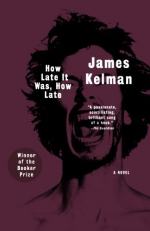|
This section contains 536 words (approx. 2 pages at 300 words per page) |

|
SOURCE: "Out of Sight," in New Statesman & Society, Vol. 7, No. 294, March 18, 1994, p. 56.
[In the following, Morton offers a favorable review of How Late It Was, How Late, discussing Kelman's use of language and his focus on the dispossessed.]
If fantasy is to be something other than mere wishfulfilment, it requires a measure of resistance: either some collision with the boundaries of the actual, or else the resistance of language itself. Hubert Selby Junior's The Room offers an extreme example. A prisoner incarcerated in his own unconscious spins violent sexual fantasies in language that remains morbidly inchoate, without hope of redemption or escape.
James Kelman's new novel [How Late It Was, How Late] works fascinating variations on the same basic situation. The difference is that Sammy enjoys a measure of ambiguous freedom. He is sprung from custody in a cat-and-mouse exercise designed to get at something juicier than the...
|
This section contains 536 words (approx. 2 pages at 300 words per page) |

|


